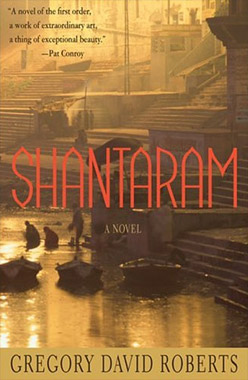
| HOME |
| NERVE |
| REVIEWS |
| ARCHIVE |
| EVENTS |
| LINKS |
| ABOUT US |
| CONTRIBUTORS |
| BACK ISSUES |
| CONTACT US |
 Shantaram
Shantaram
Written by Gregory David Roberts
Abacus, £10.99
Reviewed by Kathryn Lamble
Shantaram is a mammoth of a novel. At over 900 pages long you may think it would take a feat of sheer endurance just to get through. However, what you find is delicately affecting and lyrical prose and rich characterisation emerging from a warm-hearted (if occasionally over-the-top) story of searching, redemption and above all, love.
Shantaram is a book that only Gregory David Roberts could write. And while this may sound needlessly banal, the book is actually a fictionalised account (to what extent we are still unsure) of his own life. In 1980 he escaped from an Australian prison where he was serving time for armed robbery and recovering from heroin addiction; armed with only a fake passport and endless bravura he makes his way to Bombay.
It is here that our narrator, Lindsay – christened Linbaba and later the eponymous Shantaram – meets a host of wonderful and sinister characters as he weaves in and out of the rich tapestry of slum life in Bombay. It’s a place of extremes where he comes to know the deepest kindness while also becoming privy to the corruption erupting in his new found home. He establishes a health care clinic while also working for the Bombay mafia, falls in unrequited love, works in Bollywood and finds himself back in jail, in India this time. His journey takes us from Bombay to Afghanistan and back to his home country upon his eventual capture. And that’s not even the half of it.
Roberts’ prose is often sublime and deeply philosophical, conjuring up rich and powerful images of his new life and of those that drift in and out of it. As a reader we are treated to an author with the power to viscerally convey emotions and sensations with arresting immediacy. What permeates the novel is the sense that we are reading a man self-fictionalising and coming to terms with the choices he’s made throughout his life. Unfortunately, with that come passages that, for all their good-will and earnestness are often over-worked, indulgent and just plain sentimental.
But it’s the beautiful moments of vivid elegance and human insight that redeem the novel and elevate it from the usual slew of semi-autobiographical, lurid and self-indulgent memoirs. Life for Roberts’ narrator, and I suspect Roberts himself, has not been a spectator sport; it has been something to immerse himself in. He has not merely observed or passively experienced anything and that may well be the best way to approach Shantaram itself. Dive into this brave and earthy book; it’s not a spectator sport.
Sorry Comments Closed
Comment left by Sandra Gibson on 8th August, 2011 at 20:20
I'm impressed that Kathryn has been able to give such a succinct resume of this mammoth book!I'm half-way through and I agree with the reviewer about the parts that are overwrought. I will definitely read on because he is redeemed by his human compassion and insight.
Comment left by Elena on 13th April, 2012 at 13:28
I'll go check it out since I haven't met you yet in real life like other lucky people.I hgbout Shantaram a while a got but still haven't started reading it, did you, did you like it? I'm reading Memoirs of a Geisha atm and it goes slow since I only have time in bed in the evenings to get through 4 or so pages.